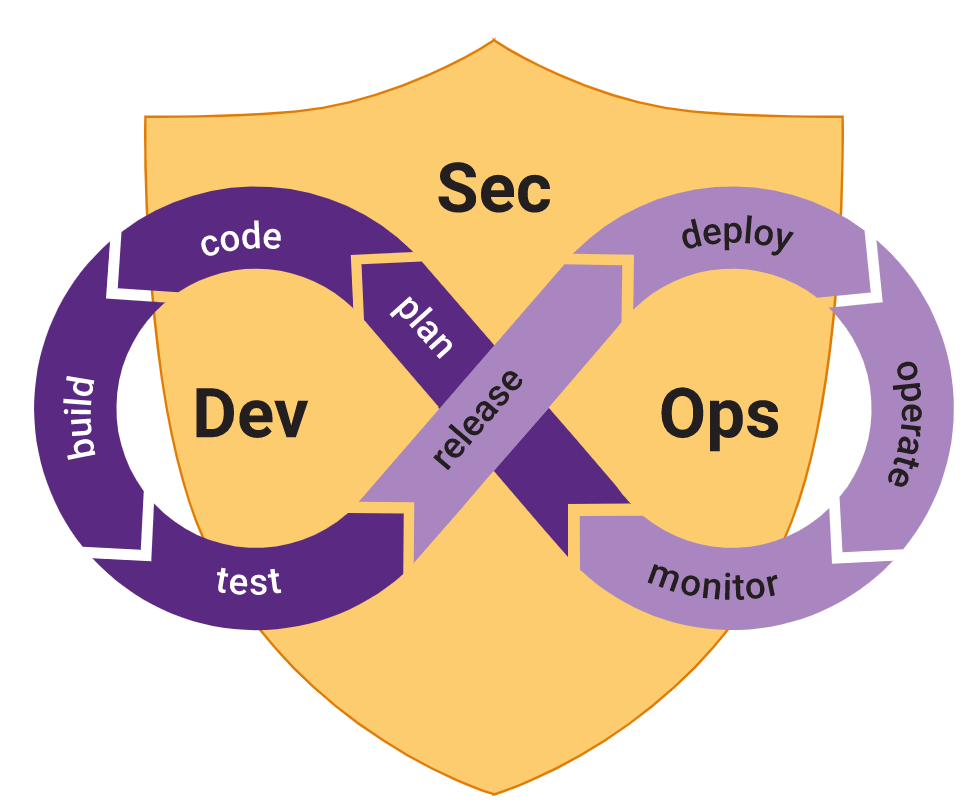Security-driven DevSecOps solutions play a mission-critical role in custom software development. The collaborative combination of development, security, and operations teams – DevSecOps remains a dominant trend in the application engineering world. In short, this innovative practice integrates security into every phase of the software development life cycle (SDLC).
DevOps is the combination of cultural philosophies, practises, and tools that increase an organization’s ability to deliver applications and services at high velocity. DevOps enables organisations to evolve and improve their products at a faster pace than organisations that use traditional software development and infrastructure management processes. Because of this speed, businesses are able to provide superior service to their clients and engage in more fruitful competition in the market.
DevSecOps privileged quality-focused teams can rapidly deliver secure, reliable, bug-free code. As a programmer yourself, consider the impact that DevSecOps could have on your day-to-day operations, practices, and priorities. This way, you can employ these methodologies when developing a blockchain-powered app. Read on to learn the role of DevSecOps in custom software development.
Gain Security Threat Visibility
For a start, DevSecOps strategies give teams actionable insights and visibility into security threats. DevSecOps encourages the collaboration and accountability needed for scalable application security. Security teams are on the frontlines – detecting, diagnosing, and reporting on vulnerabilities or threats as soon as encountered. These issues are communicated to the development team, which is charged with repair and restoration.
All in the meanwhile, your operations department stands ready to regain stability or maintain current performance. Together, these three divisions hold the shared responsibility of securing applications throughout the lifecycle. Without this approach, it’s highly possible that security weaknesses and threats could go unnoticed. Indeed, switch to DevSecOps to gain actionable insights into threat visibility.
Optimize Application Security Testing
By adopting DevSecOps, custom software development teams can test applications rapidly, accurately, and thoroughly. Implement powerful DevSecOps solutions to streamline and accelerate software composition analysis. You can use advanced SCA tools like JFrog Xray to manage license compliance, scan for security vulnerabilities, and identify open-source software (OSS) dependencies. Also, these resources provide security policy enforcement – eliminating build failure and binary downloads. You can additionally adopt tools that help with static (SAST), interactive (IAST), and dynamic (DAST) application security testing. These procedures help uncover potentially exposed interfaces and increase testing accuracy. Surely, implement DevSecOps development and delivery models to optimize application security testing.
Secure CI/CD Processes
DevSecOps gives software development teams an effective way to secure continuous integration and delivery processes. Employ DevSecOps practices to automate acceptance and security testing. You can quickly scan containerized images, run input validation inspections, and perform real-time verification authorization. DevSecOps makes it easy to automate additional QA activities too – like security patch updates and configuration management.
With these capabilities, you can promote security policy compliance and human error elimination across your development pipeline. Plus, you’ll be able to identify serious security vulnerabilities or system exploits early-on. Certainly, transition to DevSecOps to automate and secure CI/CD processes.
Streamline Software Delivery
When teams embrace DevSecOps on custom software projects, project delivery tends to go faster, smoother, and error-free. The DevSecOps model help applications move along the release pipeline with minimal risk exposure. These tactics support event tracing, vulnerability tracking, and governance management. Before the project reaches release, it’s already been subject to multiple security tests, audits, scans, and inspections. This tends to reduce the complexity of required fixes needed during deployment and distribution. Absolutely, encourage a security-shift towards DevSecOps to streamline software delivery processes.
Lower Development Costs
It’s no secret that DevSecOps can seriously impact programming expenses too. Anyone familiar with automation likely knows how it can lower costs, especially compared to expensive human labour. As mentioned earlier, DevSecOps has the potential to automate numerous development, security, and operations activities. With this functionality, you can easily satisfy security standards and demands – without wasting valuable time or financial resources. Even more, AI-backed automation can improve speed too.
This way, you can release your software quicker and start earning download revenues. You’ll also stand a better chance of outpacing your biggest industry competitors. In short, embrace DevSecOps to lower the cost of your security, development, and operations responsibilities. You can also reduce the potential of encountering security issues, license compliance, and data breaches – all which come with financial penalties. Definitely, implement DevSecOps to lower custom software development costs on your next enterprise project.
DevSecOps plays a mission-critical role in application security for custom software programs. For a start, it gives teams actionable insights and visibility into dangerous security threats. In addition, powerful DevSecOps tools make it easy to optimize application security analysis and software composition analysis. Plus, invest in these tools to automate and secure your CI/CD processes. At the same time, you can use DevSecOps to streamline and accelerate software delivery processes. Even more, DevSecOps can have a monumental impact on development, operations, and security costs. Follow the points above to learn the role of DevSecOps in custom software development.
DevSecOps accelerates secure code development. DevSecOps embed security within the SDLC from build to production. DevSecOps stakeholders share security responsibilities.
DevSecOps engineers must have skill of PHP, Java, JavaScript, Ruby, and Python. Jenkins, GitLab CI/CD, CircleCI, Puppet, Chef, and Spinnaker should be familiarised.
1. Process monitoring
2. Writing risk analyzes
3. Incident management
4. Testing
IriusRisk, a collaborative threat modelling tool, is used for DevSecOps planning. Jira Software and Slack are other alternatives.






 10+ Best Bitcoin Mining Software of 2023 – Legit & Guide
10+ Best Bitcoin Mining Software of 2023 – Legit & Guide